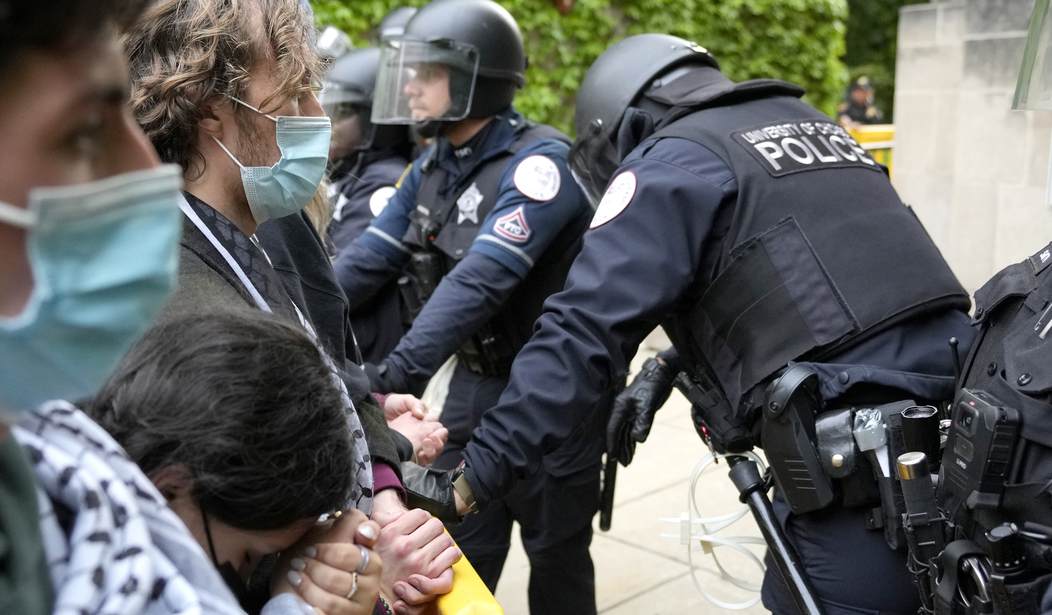It's impossible to feel sorry for the university administrators who found themselves confronted with disruptions on campus this year. As an author pointed out at the Atlantic earlier this month, most of the schools in question trade on their own history as the homes of radical activism. They encourage students to admire the activists of a previous generation, luring them in with the promise that activists are respected figures on campus.
The police activity we are seeing universities level against their own students does not just scuff the carefully cultivated progressive reputations of elite private universities such as Columbia, Emory University, and NYU, or the equally manicured free-speech bona fides of red-state public schools such as Indiana University and the University of Texas at Austin. It also exposes what these universities have become in the 21st century. Administrators have spent much of the recent past recruiting social-justice-minded students and faculty to their campuses under the implicit, and often explicit, promise that activism is not just welcome but encouraged. Now the leaders of those universities are shocked to find that their charges and employees believed them. And rather than try to understand their role in cultivating this morass, the Ivory Tower’s bigwigs have decided to apply their boot heels to the throats of those under their care...
The sense that Columbia trades on the legacy of the Vietnam protests that rocked campus in 1968 was widespread among the students I spoke with. Indeed, the university honors its activist past both directly and indirectly, through library archives, an online exhibit, an official “Columbia 1968” X account, no shortage of anniversary articles in Columbia Magazine, and a current course titled simply “Columbia 1968.” The university is sometimes referred to by alumni and aspirants as the “Protest Ivy.” One incoming student told me that he applied to the school in part because of an admissions page that prominently listed community organizers and activists among its “distinguished alumni.”
Joseph Slaughter, an English professor and the executive director of Columbia’s Institute for the Study of Human Rights, talked with his class about the 1968 protests after the recent arrests at the school. He said his students felt that the university had actively marketed its history to them. “Many, many, many of them said they were sold the story of 1968 as part of coming to Columbia,” he told me. “They talked about it as what the university presents to them as the long history and tradition of student activism. They described it as part of the brand.”
If you make activism a core part of your brand, then you're going to get activists like the ones who created all the tent camps on campuses around the country. If you praise the activists who took over buildings 50-some years ago, you're going to get building takeovers now.
But obviously, campus administrators aren't paid to be student radicals and can't tolerate anti-Semitism, building takeovers, vandalism and having a few hundred student protesters disrupt graduation ceremonies for thousands of people. So in the end, a bunch of them called the police. In some cases students who refused to clear out on their own volition have been suspended and prevented from graduating.
Today, Pamela Paul makes the case that the protest hagiography most of these students have been raised on leaves out a key lesson: There is a price to be paid for protesting.
“There is no right answer,” Steve Cohen, a partner at the boutique litigation firm, Pollock Cohen, said when I asked if protesting might count against an applicant. “But if I sense they are not tolerant of opinions that differ from their own, it’s not going to be a good fit.”...
For decades, employers used elite colleges as a kind human resources proxy to vet potential candidates and make their jobs easier by doing a first cut. Given that those same elite schools were hotbeds of activism this year, that calculus may no longer prove as reliable. Forbes reported that employers are beginning to sour on the Ivy League. “The perception of what those graduates bring has changed. And I think it’s more related to what they’re actually teaching and what they walk away with,” a Kansas City-based architectural firm told Forbes.
The American university has long been seen as a refuge from the real world, a sealed community unto its own. The outsize protests this past year showed that in a social media-infused, cable-news-covered world, the barrier has become more porous. What flies on campus doesn’t necessarily pass in the real world.
I think Paul doesn't quite go far enough. The lesson here isn't that what flies on campus may not fly in the real world. The message students should be absorbing is that some of this stuff doesn't even fly on campus which is part of the real world. As Paul notes in passing, it's not a coincidence that so many of the protesters hid their faces behind masks or scarves. It's not a coincidence that they refused to let outsiders into their "liberated zones" to film them. Even the students themselves knew their could be a price to pay if they were identified.
The point is that the Antifa approach to illegal activity, where everyone dresses the same to hide their identity so they can break the law, is not something universities should be encouraging or tolerating. Universities should instead be sending the message that activism is sometimes admirable because it is costly. If you want to takeover a building, scuffle with police and rant about end-stage capitalism that's your choice, but don't expect to get that high-paying law or finance job at a firm looking for people who defend private property, abide by the law and make a good living doing it.
You can disrupt the system or be part of it but not both. That's the message that a lot of these students never seem to have grasped.








Join the conversation as a VIP Member